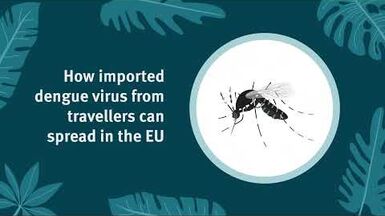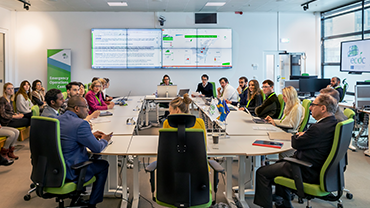Fellows participate in Outbreak Investigation module in Berlin
The EPIET, EUPHEM. PAE, and MediPIET Outbreak Investigation module took place in Berlin, Germany from 5 – 9 December 2022. It was organised by the Robert Koch Institute in collaboration with ECDC.
The hybrid module aimed at equipping fellows with the necessary skills in practical application of data management and analysis during outbreak investigations, including how to interpret and communicate data.
Participants learned how to describe and implement the 10 steps of an outbreak investigation, manage datasets using R, use various statistical tests to compare different groups and conduct descriptive, univariable, and stratified analysis for cohort and case-control studies.
In addition, the training focused on interpretation and communication of statistical analyses, Social Network Analysis, R-based mapping, and risk communication. It also included interactive presentations in plenum as well as practical group exercises supervised by scientific module facilitators.
A total of 80 participants attended the training, including 16 MediPIET fellows in cohort 5 from 11 different countries: Albania, Armenia, Georgia, Kosovo[1] (2), Lebanon (2), Libya (2), Moldova, North Macedonia, Palestine[2], Servia and Tunisia (2). In addition, there were two nominated external participants from Montenegro and Türkiye.
Background
The Mediterranean and Black Sea Programme for Intervention Epidemiology Training (MediPIET) aims to enhance health security in the Mediterranean and the Black Sea region.
It does so by supporting capacity building for prevention and control of threats posed by communicable diseases through the implementation of a long-term regional Field Epidemiology Training Programme (FETP), Training of Trainers activities (ToTs), annual scientific events and other networking activities.
MediPIET is part of the EU Initiative on Health Security, a five-year programme (2020–2025) aimed at enhancing public health preparedness and response capacities of the European Union enlargement and the European Neighbourhood partner countries.
[1] This designation is without prejudice to positions on status, and is in line with UNSCR 1244/1999 and the ICJ Opinion on the Kosovo declaration of independence.
[2] This designation shall not be construed as recognition of a State of Palestine and is without prejudice to the individual positions of the Member States on this issue.







